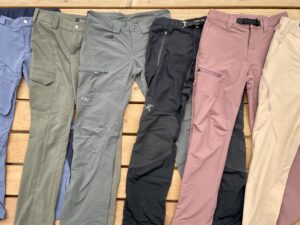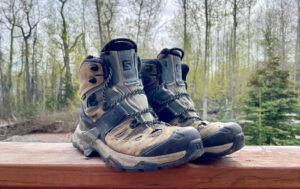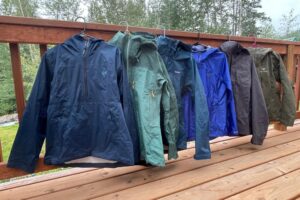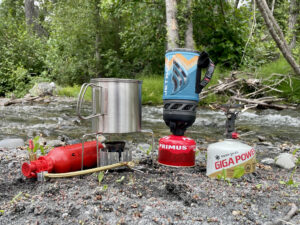Did you know that snow reflects 80% of UV radiation? Even if it’s cloudy, the UV reflection off the snow can sunburn your cornea. On a bluebird day, sunglasses provide the perfect amount of protection. Sometimes ski goggles can be too warm, especially while backcountry touring or on spring days at the resort.
Sunglasses are a must-have piece of skiing gear. So, without further ado, here are some of the best sunglasses for skiers.
The best sunglasses for skiing
Best overall sunglasses: Sunski Dipsea – Polarized Recycled Sunglasses For Skiing

- Recycled plastic
- Polarized lenses
- Lifetime warranty
- Replaceable lenses
- 100% UV-protected lens
Pros
- Comfortable, snug fit but still breathable
- Lifetime warranty
- Budget-friendly price
Cons
- Scratches somewhat easily
These sunglasses are so great that I’ve bought them multiple times. I wear them for just about everything outside because of the polarized lens and snug fit. Fit is one of the most important aspects of skiing sunglasses because the last thing you want is your eyewear falling off when you’re on a steep line. If you’re looking for ski touring sunglasses, look no further than Sunski. They provide plenty of protection but feature a lot more airflow than goggles.
These sunglasses fit perfectly on my face and they’re stylish too, which was always my biggest complaint about “performance sunglasses”. Colored lenses are also a high priority, so I appreciate the color choices Sunski offers. Also, the lightweight frame is made out of recycled plastic saved from landfills.
My favorite part about all Sunski sunglasses is their lifetime breakage warranty. Basically, whether you step on these, drop them off a cliff, run over them with a bike, or whatever life throws at you, Sunski will replace them. Trust me, I’ve used their warranty. The only thing that isn’t covered under warranty is scratched lenses, but Sunski sells new lenses that snap into the recycled plastic frame for less than $20. Compared to the price of a cheap pair of sunglasses that you’ll immediately scratch up and then have to buy a new pair, buying a pair of Sunski’s is cheaper and better for the environment. Read the in-depth review here.
See Sunski Dipsea Polarized Recycled Sunglasses on Amazon
See Wiley X Gravity Polarized Sunglasses on Sunski
See Wiley X Gravity Polarized Sunglasses on REI
Most comfortable: Oakley Holbrook Polarized Rectangular Sunglasses For Skiing

- Polarized or iridium lenses
- High-definition optics
- Impact protection
- 100% UV-protection coating
Pros
- Stylish, great even for everyday wear
- Replacement lens options
- Polarized or non-polarized iridium lenses
Cons
- Iridium lenses scratch easily if not stored in a soft material
Oakley’s Holbrook sunglasses take a classic style inspired by 1940s, 50s, and 60s film stars and bring it to the modern era. These sunglasses use polarized or iridium lenses and high-definition optics to provide the clearest vision while you ski. If you’re looking for sunglasses of the highest quality, these are the skiing sunglasses for you. Oakley offers several replacement lens options whether the original ones get damaged, or you just want a sweet new look. Plus, the Holbrooks are available with Oakley’s prescription lenses.
Their six-base lens curvature allows for great peripheral vision, and Prizm lenses enhance color and contrast. They are impact-resistant, durable, and will provide you with maximum comfort all day long. If you’ve never owned a pair of Oakley’s before, then there is no better place to start than with this classic pair.
See Oakley Holbrook Polarized Rectangular Sunglasses on Amazon
Coolest design: Julbo Vermont Classic Glacier Sunglasses For Skiing

- Retro mountaineering style
- Leather nose and side shields
- Spectrum three or four polycarbonate lens
- Adjustable earloops
- Lifetime warranty
Pros
- One of the coolest-looking sunglasses on the market
- Pilot design offers ample coverage
Cos
- Somewhat bulky design
- Awkward fit on some faces
If you’re trying to be the coolest person on your ski tour, look no further than these iconic sunglasses. With the style of old-school mountaineering sunglasses, Julbo took it up a notch in performance with Spectron three polycarbonate lenses. Round lenses have a timeless feel, and the leather side shields and nose pieces add extra protection from reflecting UV radiation. On snow or glaciers, especially on a sunny day, having this extra coverage could be the difference between eye damage and a great day outside skiing.
The lightweight frame includes flexible and adjustable arms to dial in the perfect fit. Plus, choose the style that’s right for you with various color schemes from blue lenses with white leather to green lenses with tan leather.
See Julbo Vermont Classic Glacier Sunglasses on Amazon
Best budget sunglasses: RIVBOS Polarized Sports Sunglasses For Skiing

- Shock resistant
- Polarized lenses
- Hard portable carry case
- Head strap included
Pros
- Very affordable, great entry-level sunglasses
- Accessories included
Cons
- Mirror coating can wear away over time
Our budget choice for polarized sunglasses with mirrored lenses, these RIVBOS glasses won’t break the bank. The simple style wraps around your face more than some sunglasses, which provides extra protection from reflected light. The lightweight construction of the plastic frame includes soft rubber on the nose pads and arms to keep the glasses in place comfortably. The shock-resistant lenses help with durability. Choose from a variety of lens options for various light conditions, from low light to bright sun with lots of glare.
The RIVBOS glasses also come with a variety of accessories, including a hard case to protect the glasses while in transport or in storage, a cleaning cloth and pouch, a polarized test card, a headwrap, and an instruction booklet.
See RIVBOS Polarized Sports Sunglasses on Amazon
Greatest coverage: Oakley Jawbreaker Non-Polarized Iridium Sunglasses For Skiing

- Wrap-around, lightweight design
- 100% UV protection
- Switchlock technology for easy replacement lenses
- Soft carry case included
- Non-polarized lenses
Pros
- Lightweight, comfortable and great-looking
- Lots of coverage
- Good for skiing and cycling
Cons
- Blind spot on sides from frame
- Side arms are shorter
These sick glasses will be the envy of everyone you ski past. The wrap-around, taller, and wider design protects all parts of your eyes from UV rays without compromising your field of vision. The adjustable temples adapt to different types of ski helmets, making these the perfect cycling or skiing glasses.
The lenses are where Oakley sunglasses shine. Swap out lenses easily with Switchlock technology, so you can choose which lens tints you want depending on light conditions. The Oakley Plutonite lenses are impact-resistant, extremely lightweight, and protect from 100% of UVA, UVB, and UVC rays. Plus, Prizm technology enhances color and contrast, which is a huge plus while you bomb downhill, needing to keep an eye out for any obstacles.
See Oakley Jawbreaker Non-Polarized Iridium Sunglasses on Amazon
Best with metal frame: Smith Optics Prospect Elite Sunglasses

- Metal frame
- Safety rated
- UVA/UVB protection
- Non-polarized
Pros
- Metal frame adds durability
- Safety rated for extra use
Cons
- Non-polarized lens options can create lots of reflections
- Narrow frames could be a con for some applications
The Smith Optics Prospect Elite is an all-day, everyday type of shade. If you’re looking for a simple design, this is a great option. The Hydrophilic Megol nose and temple pads provide a secure fit and the metal frame is virtually indestructible. The lenses resist impact and include protection from UVA and UVB rays.
More than just for skiing, these glasses are safety-rated for anyone who needs protective glasses for work. But they also stand up to snow glare or any sort of bright lights, making these the all-in-one pair of shades for an active lifestyle. They come in both polarized and non-polarized options.
See Smith Optics Prospect Elite Sunglasses on Amazon
See Smith Optics Prospect Elite Sunglasses on Moosejaw
Best all-weather protection: Wiley X Gravity Polarized Sunglasses

- Shatterproof lenses
- Facial cavity seal gasket to prevent light, wind, and debris
- Case included
- Polarized lenses
- 100% UV protection
Pros
- Great contrast
- Climate Control system protects eyes from wind and dust
Cons
- Lenses are somewhat easy to scratch
Wiley X’s Gravity sunglasses’ coolest feature is the climate control system, a facial cavity seal that seals out wind, dust, or debris from slipping through the cracks between the glasses and your face. You can also take the facial cavity seal gasket out when you don’t need the extra protection. The composite lenses meet ANSI Z87.1 safety standards for optical clarity and impact protection, meaning they work just as well as safety glasses as well as polarized sunglasses for skiing.
The plastic frame features flexible half-rubber temples with stylish cylinder accents to sit securely on your face. The glasses come with a zippered clamshell case, a cleaning cloth, a leash with rubber grips, and a t-peg elastic strap.
See Wiley X Gravity Polarized Sunglasses on Amazon
Excellent value: TOREGE Polarized Sports Sunglasses

- Three lenses included
- Rimless jacket frame
- Soft rubber nose pad for increased comfort
- Impact and scratch-resistant
- 100% UVA & UVB protection coating
Pros
- Comes with different lenses for various conditions
- Versatile yet affordable
Cons
- Not all lenses are polarized
An affordable choice for sporty sunglasses, the TOREGE Polarized Sports Sunglasses come with three interchangeable lenses to cover all light conditions. Each pair comes with a choice of a colored lens (for bright conditions), a yellow lens (for night conditions), and darker lenses (polarized for driving).
The sweet rimless jacket frame gives these glasses a lightweight feel and combined with the one-piece lens provides plenty of peripheral vision — especially when looking down at upcoming terrain. And, the polycarbonate lenses are scratch-resistant for optical clarity. A soft rubber nose pad adds comfort and stability while moving at high speeds.
This is a great pair of sunglasses for someone who doesn’t want to spend the cash for the top brands but still wants functional sun protection at a great price.
See TOREGE Polarized Sports Sunglasses on Amazon
See TOREGE Polarized Sports Sunglasses on Walmart
Why trust us
Living in Colorado, winter means lots of sun and (ideally) lots of snow. When I’m not at my desk writing, I am out in the mountains, backcountry skiing and ice climbing. I use sunglasses almost every day and have tested out many different types in different conditions. Snow glare can be intense and having proper sunglasses is vital. I’ve extensively researched and tested the sunglasses chosen for this guide, and understand what makes a high-quality pair.
Who this is for
If you like to hit the slopes in the winter, whether you’re a regular at your local mountain or only travel once or twice a year, you need eye protection. Plus, if you mostly ski during warmer temperatures, ski goggles can be too hot and uncomfortable. Sunglasses are the perfect compromise. If you’re in the market for new sunglasses, this guide is for you.
How we picked
We researched different ski sunglasses brands and chose a variety of price points with features that are important to skiers. Through testing, gathering reviews, and extensive research, we chose this list of sunglasses so that you can find a good pair for your next ski trip.
How we tested
We tested sunglasses while skinning up peaks in the San Juan mountains and skiing powder all over the Western United States. We also tested while driving to and from the mountains, since it’s also important that your sunglasses work well for you everyday life. Our sunglasses go everywhere with us, whether we’re rock climbing, skiing, ice climbing, hiking, or walking the dog.
Features to look for in sunglasses for skiing
Lens type
There are two typical lens types available for sunglasses: polarized and non-polarized. Polarized lenses offer less glare and fewer reflections, making them better for driving when you’re looking through glass or other reflective surfaces like water. However, because they create fewer reflections, it can make it harder to see patches of ice or changes in texture, which is important when skiing. Non-polarized lenses allow you to see those changes more easily.
Lens color
Different lens colors can make you look cool, but they also offer better vision in different light conditions. For example, pink lenses help with low light but are not great for the midday sun. Clear lenses also help with darker days but will blind you on a sunny day. Yellow lenses work great for overcast days with flat light and help increase contrast, which can help you see any bumps or changes in the snow, whereas a dark lens is better for the brightest days.
Side coverage
If you’re looking for side coverage, you probably want ski goggles instead of sunglasses, but some of the glasses on this list do offer removable plastic or leather side shields that provide side coverage. This helps with extra protection from sun, cold air, and wind which can help reduce eye strain while on the slopes.
Fit
Nobody wants to be uncomfortable, so make sure to check the dimensions and whether or not they have temple and nose pads for added comfort. Otherwise, you’ll be disappointed with your glasses falling off before you even make it down that first bunny hill.
Design
If style is your thing, then finding cool-looking sunglasses is going to be important. However, the design can affect the performance as well. Consider what you will be using your sunglasses for, and choose a design that fits those uses — while still looking cool.
Quality
Depending on your goals, you may want the highest quality, or you may just be looking for something cheaper and more disposable. Of course, we’re all usually looking for the best quality at the best price, but there are other times when quality reigns supreme, and the price is just an afterthought.

Sunglasses for skiing FAQ
Q: What are sunglasses for skiing?
Everyone needs a high-quality pair of sunglasses for snow activities, since snow and water are two of the most reflective surfaces. Snow can blind you, so wearing eye protection is a must while on the mountain.
Like everyday sunglasses, ski sunglasses will help protect your eyes from the sun, and keep your vision sharp when going down the slopes. This helps prevent crashes and gets you back to the bottom of the lift in one piece. If you get the right pair, you’ll also pretty look cool, too.
Q: What is the difference between ski sunglasses and ski goggles?
Goggles are larger and have padding around the lens which creates a seal to protect your eyes from wind and cold air. Ski goggles are better for storm days, where you want to avoid getting snow and wind in your eyes. Ski sunglasses are better on sunny, warm days, where you really just need that UV protection but don’t want your face to get too hot.
Q: What is the best lens color for ski sunglasses when skiing?
As we mentioned above, different lens colors offer different benefits. There’s no such thing as a catch-all best color as they all serve their purposes. Some sunglasses come with multiple lenses so that you can choose the best option for the day.
Another option is photochromic lenses. Commonly known as transition lenses, photochromatic lenses change colors (become darker) when exposed to UV light. They adapt to the light conditions around you, getting clearer when you go inside or the light gets darker.
Q: Are polarized sunglasses better for skiing?
Yes and no. Polarized sunglasses might be better for reducing glare, but especially at a ski resort, it can be vital to see any icy patches while you hurtle down the hill. Polarized lenses reduce the glare on the ice, which makes it more challenging to see it, especially at faster speeds. Polarized glasses are better for anyone who spends time on the water — especially if you fish because they allow you to see under the surface better. They’re also better for driving, as they reduce glare on windshields and other windows.
Sources:
- Snow Blindness: How to Prevent Sunburnt Eyes – All About Vision
- How to Choose A Ski Goggle Lens Color – Trip Savvy
- Heading to the Ski Slopes? Don’t Forget Your Polarized Lenses! – Optometrists Network






